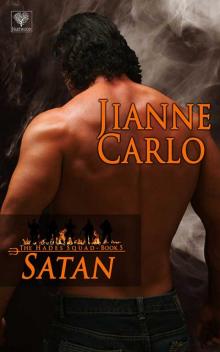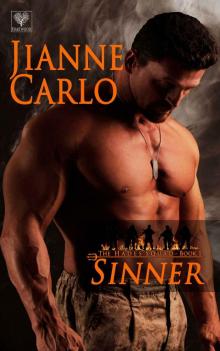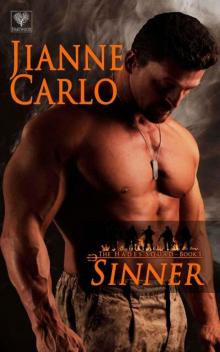- Home
- Jianne Carlo
Malice Striker Page 11
Malice Striker Read online
Page 11
Brökk’s blood iced. “Is not the caliph a believer of the Koran?”
“The caliph’s second son has converted to the Christian religion. Caliph Abbasid has, in his wisdom, granted his son permission to live in Genoa with his new wife, to study the teachings of the Christian god. We take gifts from the caliph to King Kenneth’s daughter, and I am authorized to negotiate a contract on the caliph’s behalf.”
“King Kenneth has five daughters, does he not?” Tighe broke a chunk of bread from the loaf he and Brökk shared.
“Seven, I am told. Caliph Abbasid has petitioned the king for the hand of the daughter who resides at Sumbarten Abbey.”
Chapter Seven
“Why have we been banished from the hall?” Skatha bathed her face and neck with water warmed in the cauldron above the fire.
The ladies had toiled ceaselessly to prepare the náttverðr, but afore they had finished the sweet for the end of the repast, Raki had herded them out of the kitchens and escorted them to Brökk’s lodge. After cleansing the grease and dirt acquired while preparing the many courses of the meal, Skatha dried her hands with a linen square.
“An Arabic ship arrived today. Most Arabs are Muslim and do not believe men and women should mix. They are men to be feared as they will kidnap females for their masters’ harems or to be sold at slave auctions.” Lady Gráinne’s even tone betrayed no hint of alarm, but ’twas some nuance in her phrasing that set Skatha’s bells a-ringing. They had all heard whispered gossip of the wicked harems, yet it had never occurred to Skatha a woman could be pressed into such service.
Lady Gráinne had taken the lone chair in the room, Dagrún sat on the stool at her right, while Elspeth and Muíríne sat side by side on the bed. Each had taken a turn with the warm water and soap, Skatha being the last to wash.
“Nay. Say ’tis not so. They would sell a pure Christian female?”
“Indeed, Elspeth, a female with an intact maidenhead is valued above all. The Arabs are dark-skinned and dark-haired. A woman with your red-gold hair who is virgin would bring an Arabic trader a small fortune.”
“Me?” Elspeth fair squealed the question. “But I am not comely like Skatha or Muíríne. I have freckles.”
Hard-pressed to choke back a guffaw, Skatha busied herself emptying the basin into the chamber pot. Elspeth’s freckles were the bane of her existence. She had tried potion after potion to erase the speckles from her face.
Muíríne had once told Skatha that she had counted less than eleven spots in an uneven spray across Elspeth’s cheeks and nose. But her friend suffered from a lack of confidence inspired by her stepfather’s refusal to grant her a sizeable dower, which in turn left her without suitors and little hope of marriage. Over the summers Elspeth had decided ’twas her lack of beauty which thwarted her dreams of a holding of her own and a pack of babes to raise.
“Your freckles would increase your value three-fold at least, Elspeth. You would bring more at auction than even Muíríne with her blue eyes and golden hair. Red hair is much prized in the Arabic world.”
“Truly?” Elspeth sounded pleased at the notion. Skatha shook her head. When had matters turned so upside down?
“Elspeth. ’Tis not a goal to which you should strive—being auctioned on a slave block. Each one of you would be a sore temptation for an Eastern trader. The three of you together would prove an irresistible enticement. ’Tis the reason, to answer your question, Skatha, we have been banished from the kitchens. I am cert the jarl wanted none to know of us or of you, his new wife.”
Lady Gráinne’s words gave Skatha pause. “But my dark hair would make me less valuable. And I am his wife. Surely none would dare steal me.”
“Nay, Skatha. Your violet eyes would make you a prize worthy of much coin. And if any were to suspect your goddess lineage, you would be stolen without a moment’s hesitation.”
Had Brökk indeed imprisoned them in the lodge for protection? Skatha mulled over the abbess’s words as she walked back to the bed and eased onto the mattress. Elspeth gave her a quick hug. Muíríne reached over and patted her forearm.
She scooted back and sat against the wall relishing the coolness of the stone after the heat of the kitchens. Gathering her hair to one side, she divided the thick mass into three lengths and began braiding.
“Aye, milady has the right of it, Skatha. Ye must not wander while these heathen walk the holding freely. The jarl should throw them in the dungeons. They are evil men. Them’s with their dildos and opium orgies—”
“Cease your prattling, Dagrún. You will scare the slumber from my charges. Now, Skatha, tell of the jarl’s stepsister and how she came to be taken.”
Not fooled by the abbess’s abrupt change of topic, Skatha nevertheless complied with the command, relating the tale as told to her earlier. By the time she finished, Skatha had tied off her long plait.
“Lady Gráinne looks about to explode,” Elspeth whispered.
“What have you not told me, child?” The abbess demanded.
Bracing for a scolding, Skatha divulged the contents of the missive Brökk and Konáll had intercepted that had the king’s seal. “’Tis some conspiracy, my lady?”
“Are you cert you have the right of it, Skatha? The jarl’s sister, Hjørdis, was sired by ThMrr? And King Kenneth’s missive commanded she be taken to Sumbarten?”
She cocked her head to one side, having never heard that particular tone from Lady Gráinne afore. “Aye, I am cert. Howbeit, I told Lord Brökk you would ne’er accept such a pagan notion. And that you would be wont to refuse the fealty oath.”
In the quiet that followed, the fire hissed and snapped, and a log fell, the soft thud akin to thunder. A finger of ice rolled up Skatha’s spine and lifted the hairs at her nape. She could feel all eyes on her. What had she said or done to warrant such attention and such dread-laced silence?
“Dagrún, Elspeth and Muíríne—don your cloaks and take a turn around the lodge. Ask the guards to accompany you. I will come to you when ’tis time for you to return.”
None of the others uttered a word, not even a whispered aye. But Dagrún grunted and the stool creaked when she heaved her stout body off the furniture. Muíríne and Elspeth exchanged furious whispers, footsteps shuffled this way and that, and finally the door closed.
Skatha’s stomach turned over.
There must be some truth to the missive’s contents.
Had the king, her father, ordered Hjørdis’s abduction? Was he behind Etta’s actions? Had King Kenneth condoned Brökk’s murder? Was their union doomed? A bittersweet pang caused a sharp pain in her chest. Somewhere in the corners of her mind, hope for a normal future, children, her own holding to manage, a small chance at happiness, had not only taken seed but sprouted. ’Twas the cruelest of all pranks, the teasing glimpse of joy and peace hammered to naught by the bald facts.
For long moments Lady Gráinne did not speak or move. Skatha bowed her head, awaiting a blow cert to shatter the safe world she once knew.
“I have seen this day coming from the moment you were given into my care and I have dreaded its arrival.”
Skatha plucked at the skin of her throat, a nervous habit she had ceased some three summers afore. She folded her hands in her lap, and the dread the abbess spoke of shrouded her very soul. “My lady. ’Tis so dire the news you have to tell me?”
“Nay, not dire, child, but ’twill change what is between us.” The straw sighed when Lady Gráinne slipped onto the bed. She grasped Skatha’s fingers. “I am one of the guardians of those born of a union between a mortal and an immortal.”
“I am the daughter of the jötunn goddess, Skaði? ’Tis true, then?” Skatha gripped Lady Gráinne tightly, afeared to let go, afeared if she lost the warmth of the abbess’s touch she would spiral away into the damp, dank, whirlwind threatening to shatter her mind.
“Aye. You are the daughter of King Kenneth of Scotland and the goddess, Skaði. Nay, child. Weep not.” Lady Gráinne wiped away tears Skatha
did not know she had shed.
“Wanted by neither. ’Twould have been better if they had left me to die the way the Vikings do with their feeble infants—”
“Skatha. Wallow not in self-recrimination. And know you this. Your mother comes to me every Samhain. She watches o’er you constantly. The king wanted you raised at court and your mother refused. ’Twas she who appointed me your guardian. Think you Sumbarten has stood without interference on my abilities alone? Nay, child, your mother has kept the abbey and you safe. The king’s legions matter not. ’Tis Skaði who has ensured none would ever harm you.”
“Why did she cast me aside?” Skatha blurted the question that had long plagued her every waking moment, inhabited her nightmares, and driven her to defy the monks’ prediction of her soul’s eternal damnation.
“The ruler of the jötunns, King Thrym, refused your mother’s petition to keep you with her. He forbade her to ever contact you on pain of death. Your death, Skatha, not hers.”
’Twas too much all at once. She knew not how to interpret Lady Gráinne’s explanations. “And King Kenneth?”
“As I said afore, he wanted you raised at court, but your mother would not hear of it. She feared if any knew of your lineage, they would capture you and force you to serve them.”
She shook her head. “Serve whom? How?”
“You have not come into your powers as yet, child. But, when you do, many will covet you for their own use.”
“My lady, I do not understand. I am blind. I have no goddess powers. You know this well.”
“You do, Skatha. Consider your mastery of the wild stallions, the way the wolfhounds and mountain cats cleave to you. Think you back to the first time a highlander tried to steal you for a wife. ’Twas not your blindness that spurred him to bring you back to Sumbarten. ’Twas the light he saw around you, the halo of colors.”
“A halo of colors?” She frowned. “I know not what you mean, my lady.”
“Oft times within the last two seasons I and others have seen a glow around you. ’Tis like a light framing your form, but one of many hues.”
She digested this information, but it made no sense at all. “Who, aside from you, has seen this?”
“The highlander who tried to take you to wife and Lady Arianne. ’Twas she who went to the bishop and accused you of sorcery. King Kenneth refused to consider the bishop’s petition to try you for conspiring with Satan.”
“Nay!” Skatha bounded to her feet. “Why do I know naught of this? How dare that wench? ’Twas because her lout of a suitor composed those laughable verses about mine amethyst-jewel eyes and recited them before the entire hall. ’Twas after that eve Lady Arianne forgot the bucket at the top of the stairs. I was abed for seven days with my bruises and cuts, my lady. I knew ’twas done a-purpose.”
“Curb your temper, child. ’Twill not aid us in this matter. I did not tell you of the accusation because naught came of it and I feared you would shower your wrath upon Lady Arianne.” Lady Gráinne sighed heavily. “She was due to leave Sumbarten within the sennight, and I judged it better to leave well enough alone.”
’Twas easy for the abbess to order her to stay her anger, but Skatha knew if the witch Arianne had been anywhere near, she could have scratched her eyes out. She seethed. Arianne had caused her grief enough with her thinly veiled comments regarding Skatha’s homeliness, lack of feminine curves, and sorcerer eyes. She paced a tight circle and took several deep breaths in a futile attempt to contain her fury.
“Pay no mind to the past, Skatha. We needs deal with the here and now.” Lady Gráinne came up behind her and stilled her rapid strides by cupping her shoulders. “Let us discuss what we know.”
Skatha remembered Brökk’s sister and the king’s missive. “Guard you Hjørdis too?”
“Aye. If she is given to me. I am bound to act as guardian for any progeny of mortal and immortal. ’Tis my duty.”
“Does the king know this?”
“Nay. The king knows naught of my role as guardian. He could not have scribed the missive Lord Brökk found.”
“Then who did? My lady, it just occurred to me. Whoever composed the scroll knows not only of your role, but also of my lineage and Hjørdis’s.” Skatha’s insides coiled tight-to-bursting. “Think you they knew Brökk would seek to take me?”
“I had not considered such a notion. Mayhap ’twould be wise to speak with the jarl and his brother.”
“But what if ’tis one of Brökk’s men?” Skatha tried to remember those who had been on board the langskip when they journeyed from Sumbarten, but she had encountered only three warriors, the captain Raki, Brökk, and Lord Konáll. “Or Lord Konáll?”
“His brother? Why say you that?”
“The dowry chest. The cyrtels did not need alteration, and I am not of a normal stature.” Skatha had pondered the point afore, but had not wanted to appear ungrateful at Konáll’s generous gift.
“Mother Mary, have mercy. ’Tis truth you speak, child, but I cannot conceive Lord Konáll capable of such treachery.”
“Do not the Jomsvikings call him Death Blow? Mayhap he covets Brökk’s holding? Or what of the captain, Raki? He is landless. Bita Veðr is a rich holding, is it not?”
“Your mind works faster than a spinning top, child. In this you wrong the jarl and his brother. The captain I would not vouch for, but I have seen naught but fierce loyalty and devotion between the two brothers. We are skipping in all directions at once. Let us speak of what we know as cert.”
“I belong nowhere,” Skatha muttered, not ready to shed her ire and irritation.
“Nay. You belong right where you stand. To task, child. You have an immortal mother and a mortal father, the goddess Skaði and King Kenneth. You have not come into your goddess powers. At least one person knows of your lineage and my role as guardian.”
“And that person knows Brökk’s sister is a soothsayer.” At Sumbarten ofttimes Lady Gráinne and Skatha had reasoned thusly over quarrels between villagers and farmers and come to some resolution over the disputes. “Think you the missive from the king was a ruse? Mayhap a way to snatch both Hjørdis and I for some nefarious purpose? Hjørdis can predict the outcome of a battle. I can do naught. I have no visions. No special talents.”
“You have an affinity for animals. They cleave to you, but how can such a thing be used? The battle soothsaying to a warrior is paramount, and I can clearly see Hjørdis’s value to any monarch or man who craves power. Mayhap the two of you together form some sort of magikal melding?”
The abbess’s reasoning proved solid. Skatha could find no objection to what Lady Gráinne said, but neither could she find a link between predicting the outcome of a battle and her connection to horses, wolfhounds, and mountain cats. Mayhap her lack of vision allowed her to bond to creatures?
“Is my blindness a jötunn curse?”
“I know not, child. Your mother refuses to speak of your powers or of what lies ahead for you, though I suspect she well knows. She has given me scant information and alas, what she has divulged I am sworn not to impart until ’tis time.”
* * *
Brökk braced his shoulder on the wall and listened to Lady Gráinne and Skatha’s heated discussion. His wife’s passion and loyalty pleased him, but he discerned a hoard of buried resentment at the way the Scottish nobles and monks had treated her.
’Twas the second time she’d spoken of the Lady Arianne. The noblewoman’s rabid jealousy of Skatha was as plain as the lines on his palms. His wife had no notion of her unique beauty. True, she had not the overripe curves of Etta, but ’twas some quality about her that captivated men like the mesmerizing pull of moonbeams silvering a langskip’s wake.
He would wager all the gold coin in his chest that Lady Arianne could not hold a wick to Skatha’s flame. But ’twas of no import this petty envy between females; what had him arrested was this news of Lady Gráinne as guardian. Could the abbess be part of a larger plot to unite Hjørdis and Skatha?
&nb
sp; Did Harald Bluetooth know of both his sister’s and his wife’s lineage? He, Konáll, and Dráddør had never spoken of Hjørdis outside of Bita Veðr. Not once. He would swear that on his sister’s life.
Brökk blew out a long sigh. He and Konáll had met with Tighe and Ali after the náttverðr. Tighe’s recounting of his escape from Baron Loudon’s dungeons had prompted more questions than answers. Staring at the quarter moon, he pondered the Scotsman’s strange tale of intrigue, betrayal, and usurpment.
Baron Loudon had invaded and seized control of Tighe’s holding in Dalriada, Stillhaig Castle, in early spring. Tighe had been absent from his holding while providing his knight’s fee service to King Kenneth.
When the unsuspecting Tighe had returned to Stillhaig, Loudon had him and his men imprisoned in his own castle’s dungeons. There he became aware of two other prisoners, Dráddør and Hjørdis.
With the aid of the few loyal retainers, Tighe and Dráddør managed to communicate with each other and began to plot their escape. Their plans went awry and Hjørdis and Dráddør were recaptured, but Tighe and three score warriors had absconded with Dráddør’s langskip, Vengeance Hammer.
Both Dráddør and Hjørdis remained captives of Baron Loudon. The only comfort Brökk derived was that, according to Tighe, they were being held in the same cell and were well fed and clothed and in good health.
“Stand you there waiting for Hrímfaxi to draw the goddess Nótt to an end?” Konáll whispered his greeting and joined Brökk in holding up the lodge’s walls.
“Nay. Night will rule the sky for some time. I fear the steed, Hrímfaxi, is too weary to haste Nótt’s retirement this eve.” Brökk crossed his arms.
“Why do the women circle the lodge?” Konáll and Brökk were well out of sight of the women and their guard escorts.
“Lady Gráinne wanted a private moment with Skatha. Skatha is goddess born and King Kenneth is her sire.” Briefly Brökk told his brother what he had overheard.

 The Dragon Slayer
The Dragon Slayer White Wolf 2: The Call of a Soul
White Wolf 2: The Call of a Soul Manacled in Monaco
Manacled in Monaco Vengeance Hammer (Viking Vengeance)
Vengeance Hammer (Viking Vengeance) Branded By Etain
Branded By Etain Death Blow
Death Blow Notorious in Nice
Notorious in Nice Satan
Satan Valentine Voodoo
Valentine Voodoo Sinner (The Hades Squad Book 1)
Sinner (The Hades Squad Book 1) Sinner (The Hades Squad #1)
Sinner (The Hades Squad #1) Demon Seed
Demon Seed The Peacemaker
The Peacemaker The Bear and the Bride
The Bear and the Bride T is for Temptation
T is for Temptation The Seducer (Viking Warriors)
The Seducer (Viking Warriors) Malice Striker
Malice Striker Alpha Me Not
Alpha Me Not